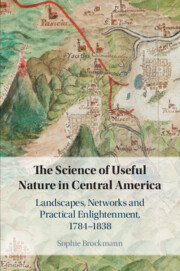 The Science of Useful Nature in Central America
The Science of Useful Nature in Central America Book contents
- The Science of Useful Nature in Central America
- The Science of Useful Nature in Central America
- Copyright page
- Dedication
- Contents
- Figures
- Acknowledgements
- Notes on Translations and Names
- Abbreviations and Acronyms
- Additional material
- Introduction: A Kingdom of Vast Extension
- 1 Landscape, Ruins, and Governance
- 2 Networks of Knowledge and Action
- 3 Making Enlightenment Local
- 4 Useful Geography in Practice
- 5 Transforming Environments
- 6 Independence and Useful Nature
- Conclusions
- Glossary of Colonial Administrative Terms
- Bibliography
- Index
4 - Useful Geography in Practice
Published online by Cambridge University Press: 27 August 2020
- The Science of Useful Nature in Central America
- The Science of Useful Nature in Central America
- Copyright page
- Dedication
- Contents
- Figures
- Acknowledgements
- Notes on Translations and Names
- Abbreviations and Acronyms
- Additional material
- Introduction: A Kingdom of Vast Extension
- 1 Landscape, Ruins, and Governance
- 2 Networks of Knowledge and Action
- 3 Making Enlightenment Local
- 4 Useful Geography in Practice
- 5 Transforming Environments
- 6 Independence and Useful Nature
- Conclusions
- Glossary of Colonial Administrative Terms
- Bibliography
- Index
Summary
Chapter 4 shows that tensions about the applicability of knowledge were never more pronounced than when it came to geographical information. The Gazeta newspaper used its networks of knowledge to attempt to create a new ‘Description of Guatemala’ that would not just counter erroneous claims about the Americas peddled by some European philosophers, but also critically examined existing sources and formats of geographical knowledge. They rejected geography as a universal science that related places across the globe to each other, and instead prioritised information from current statistics as well as local historical archives. Individual reformers also contributed even more practical geographies that reported their own experience of travel. Geography and chorography was considered useful only in so far as it would help to increase trade and prosperity. It followed that securing transport connections through road and harbour works that would allow for an exploitation of natural wealth was the most important application of such knowledge. Reformers attempted to rewrite the geography of the Audiencia’s trade routes, and thought of their projects as integrating specific places more firmly into the geography of the region.
Keywords
- Type
- Chapter
- Information
- The Science of Useful Nature in Central AmericaLandscapes, Networks and Practical Enlightenment, 1784–1838, pp. 120 - 155Publisher: Cambridge University PressPrint publication year: 2020


